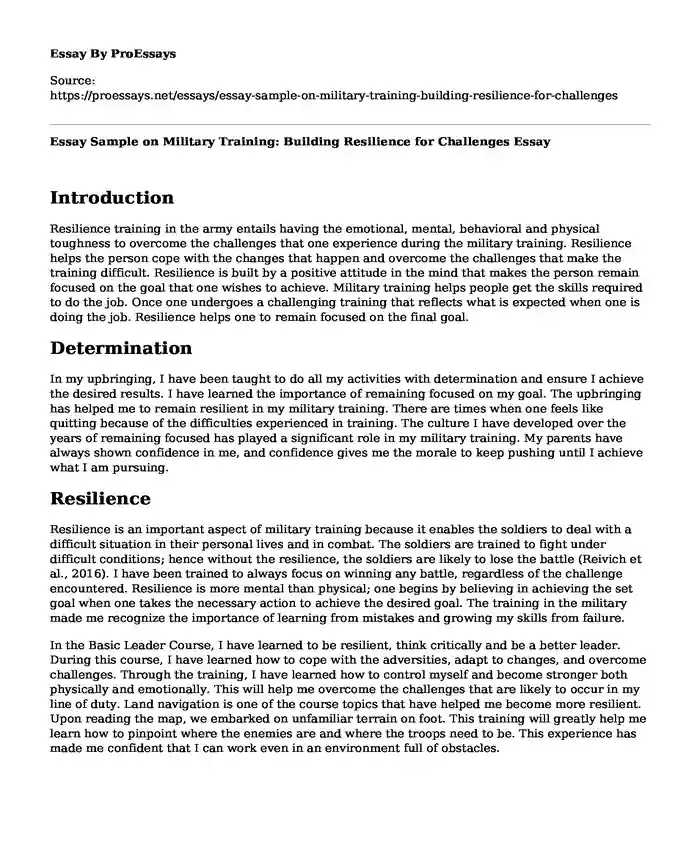Introduction
Resilience training in the army entails having the emotional, mental, behavioral and physical toughness to overcome the challenges that one experience during the military training. Resilience helps the person cope with the changes that happen and overcome the challenges that make the training difficult. Resilience is built by a positive attitude in the mind that makes the person remain focused on the goal that one wishes to achieve. Military training helps people get the skills required to do the job. Once one undergoes a challenging training that reflects what is expected when one is doing the job. Resilience helps one to remain focused on the final goal.
Determination
In my upbringing, I have been taught to do all my activities with determination and ensure I achieve the desired results. I have learned the importance of remaining focused on my goal. The upbringing has helped me to remain resilient in my military training. There are times when one feels like quitting because of the difficulties experienced in training. The culture I have developed over the years of remaining focused has played a significant role in my military training. My parents have always shown confidence in me, and confidence gives me the morale to keep pushing until I achieve what I am pursuing.
Resilience
Resilience is an important aspect of military training because it enables the soldiers to deal with a difficult situation in their personal lives and in combat. The soldiers are trained to fight under difficult conditions; hence without the resilience, the soldiers are likely to lose the battle (Reivich et al., 2016). I have been trained to always focus on winning any battle, regardless of the challenge encountered. Resilience is more mental than physical; one begins by believing in achieving the set goal when one takes the necessary action to achieve the desired goal. The training in the military made me recognize the importance of learning from mistakes and growing my skills from failure.
In the Basic Leader Course, I have learned to be resilient, think critically and be a better leader. During this course, I have learned how to cope with the adversities, adapt to changes, and overcome challenges. Through the training, I have learned how to control myself and become stronger both physically and emotionally. This will help me overcome the challenges that are likely to occur in my line of duty. Land navigation is one of the course topics that have helped me become more resilient. Upon reading the map, we embarked on unfamiliar terrain on foot. This training will greatly help me learn how to pinpoint where the enemies are and where the troops need to be. This experience has made me confident that I can work even in an environment full of obstacles.
Conclusion
In conclusion, resilience training has strengthened me mentally, physically and emotionally. Activities such as land navigation have helped me learn to cope with adversities and think critically to solve problems faster. This knowledge will be highly beneficial in my career, and I am confident that I can overcome any challenge both in my personal life and in my career. Growing up in a family that values resiliency and determination has helped me achieve maximum benefit from the training.
References
Reivich, K. J., Seligman, M. E., & McBride, S. (2016). Master resilience training in the US Army. American Psychologist, 66(1), 25.
Cite this page
Essay Sample on Military Training: Building Resilience for Challenges. (2023, Nov 16). Retrieved from https://proessays.net/essays/essay-sample-on-military-training-building-resilience-for-challenges
If you are the original author of this essay and no longer wish to have it published on the ProEssays website, please click below to request its removal:
- Research Paper on Container Deposit Laws
- I Am What I Say: How One Book Changed the Way I See the World
- Essay Sample on Abnormal Psychology: Major Depression
- Essay Sample on Safeguarding Tendencies: Adler's Neurotic Lifestyle
- Literary Analysis Essay on It Ends With Us
- Essay Example on Study of Human Brain: Genes, Mental Disorders, & Behaviors
- Free Research Paper Sample on Social Exclusion of People with Mental Illness: A Global Issue







